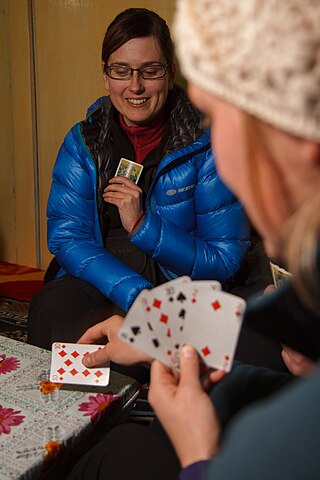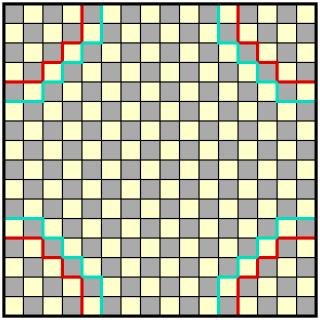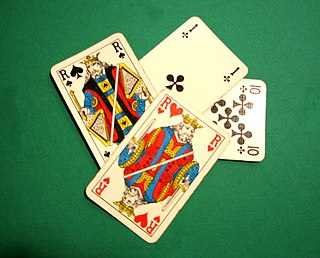
Sternhalma, commonly known as Chinese checkers or Chinese chequers, is a strategy board game of German origin that can be played by two, three, four, or six people, playing individually or with partners. The game is a modern and simplified variation of the game Halma.

Black lady is an American card game of the hearts group for three to six players and the most popular of the group. It emerged in the early 20th century as an elaboration of hearts and was initially also called discard hearts. It is named after its highest penalty card, the queen of spades or "black lady". It is a trick-avoidance game in which the aim is to avoid taking tricks containing hearts or the black lady. American author and leading bridge exponent, Ely Culbertson, describes it as "essentially hearts with the addition of the queen of spades as a minus card, counting thirteen" and goes on to say that "black lady and its elaborations have completely overshadowed the original hearts in popularity".

President is a shedding card game for three or more, in which the players race to get rid of all of the cards in their hands in order to become "president" in the following round. It is a Westernized version of Chinese climbing card games such as Zheng Shangyou, Tien Len in Vietnam and the Japanese Daifugō.

Halma is a strategy board game invented in 1883 or 1884 by George Howard Monks, an American thoracic surgeon at Harvard Medical School. His inspiration was the English game Hoppity which was devised in 1854.
A multiplayer video game is a video game in which more than one person can play in the same game environment at the same time, either locally on the same computing system, on different computing systems via a local area network, or via a wide area network, most commonly the Internet. Multiplayer games usually require players to share a single game system or use networking technology to play together over a greater distance; players may compete against one or more human contestants, work cooperatively with a human partner to achieve a common goal, or supervise other players' activity. Due to multiplayer games allowing players to interact with other individuals, they provide an element of social communication absent from single-player games.
Spite and malice, also known as cat and mouse, is a relatively modern American card game for two or more players. It is a reworking of the late 19th-century Continental game crapette, also known as Russian bank, and is a form of competitive solitaire, with a number of variations that can be played with two or three regular decks of cards.
Marjapussi is a traditional Finnish trick taking game for 4 players playing in 2 partnerships and is one of the Mariage family, its key feature being that the trump suit is determined in the middle of the play by declaring a marriage. There are variants of marjapussi for two and three players.
Minnesota whist is a simplified version of whist in which there are no trumps, and the goal is to take seven or more tricks. Four-handed whist is played with two teams. The players of each team sit opposite each other at the table. One person is elected to keep score. Typically the scorer's team is labeled as "Us" and the other team labeled as "Them". In this game, the ace is high.
Elections in Israel are based on nationwide proportional representation. The electoral threshold is currently set at 3.25%, with the number of seats a party receives in the Knesset being proportional to the number of votes it receives. The Knesset is elected for a four-year term, although most governments have not served a full term and early elections are a frequent occurrence. Israel has a multi-party system based on coalition governments as no party has ever won a majority of seats in a national election, although the Alignment briefly held a majority following its formation by an alliance of several different parties prior to the 1969 elections. Suffrage is universal to all Israeli citizens above the age of 18. Israeli citizens living abroad have to travel to Israel in order to vote. Voting booths are made available on Israeli ships. Elections are overseen by the Central Elections Committee, and are held according to the Knesset Elections Law. Israel was ranked 47th most electoral democratic country in the world and the most electoral democratic country in the Middle East according to V-Dem Democracy indices in 2023.
Pitch is the American name of the English trick-taking game of Blind All Fours which, in turn, is derived from classic All Fours. Historically, Pitch started as "Blind All Fours", a very simple All Fours variant that is still played in England as a pub game. The modern game involving a bidding phase and setting back a party's score if the bid is not reached came up in the middle of the 19th century and is more precisely known as Auction Pitch or Setback.

Bid Euchre, Auction Euchre, Pepper, or Hasenpfeffer, is the name given to a group of card games played in North America based on the game Euchre. It introduces an element of bidding in which the trump suit is decided by which player can bid to take the most tricks. Variation comes from the number of cards dealt, the absence of any undealt cards, the bidding and scoring process, and the addition of a no trump declaration. It is typically a partnership game for four players, played with a 24, 32 or 36-card pack, or two decks of 24 cards each.

Daifugō or Daihinmin, also known as Tycoon, is a Japanese shedding-type card game for three or more players played with a standard 52-card pack. The objective of the game is to get rid of all the cards one has as fast as possible by playing progressively stronger cards than those of the previous player. The winner is called the daifugō earning various advantages in the next round, and the last person is called the daihinmin. In that following round, winners can exchange their one or more unnecessary cards for advantageous ones that losers have.
The priest of the parish is a party game for 50–150 people and one chair for each person. The chairs are arranged in rows of equal numbers, half of them facing the other. Each row of chairs is given a number from one to ten. The players get into teams of five and each team sits in one of the ten rows.

Chickenfoot or Chicken Foot, also called Chicken-Foot Dominoes and Chickie Dominoes, is a Block domino game of the "Trains" family for 2 to 12 players invented by Louis and Betty Howsley in 1986. Chicken Foot is played in rounds, one round for each double domino in the set and is best for 4 to 7 players.

Mexican Train is a game played with dominoes. The object of the game is for a player to play all the tiles from his or her hand onto one or more chains, or trains, emanating from a central hub or "station". The game's most popular name comes from a special optional train that belongs to all players. However, the game can be played without the Mexican train; such variants are generally called "private trains" or "domino trains". It is related to the game Chicken Foot.

Twenty-eight is an Indian trick-taking card game for four players, in which the Jack and the nine are the highest cards in every suit, followed by ace and ten. It thought to be descended from the game 304, along with similar Indian games known as "29", "40" and "56".
Traditional Filipino games or indigenous games in the Philippines are games that are played across multiple generations, usually using native materials or instruments. In the Philippines, due to limited resources for toys, children usually invent games that do not require anything but players. There are different kinds of Filipino traditional games which are well-suited for kids, and the games also stand as one of the different cultural and traditional games of the Philippines. Due to the variety of skills used in these games, they serve an important purpose in the physical and mental development of Filipino children. These games are also an important part of Filipino culture.
Buraco is a Rummy-type card game in the Canasta family for four players in fixed partnerships in which the aim is to lay down combinations in groups of cards of equal rank and suit sequences, there being a bonus for combinations of seven cards or more. Buraco is a variation of Canasta which allows both standard melds as well as sequences. It originated from Uruguay and Argentina in the mid-1940s, with apparent characteristics of simplicity and implications that are often unforeseeable and absolutely involving. Its name derives from the Portuguese word "buraco" which means “hole”, applied to the minus score of any of the two partnerships. The game is also popular in the Arab world, specifically in the Persian Gulf; where it is known as 'Baraziliya' (Brazilian). Another popular variation of Buraco is Italian.
The Genius: Rule Breaker is the second season of The Genius, which debuted on tvN on December 7, 2013.

Seega is an abstract strategy game that originated in Egypt. It can be played on boards with cells in a 5×5, 7×7 or 9×9 disposition. Other names include Seejeh, Siga and Sidjah.











